The title of this Post makes no sense. Saint John Chrysostom is departed this earth for some seventeen centuries now – as you can see below. We can know much about him, but that’s obviously not the same as knowing him.
Oh, before we go any further, I should explain my reason for writing this Post: On January 27 we celebrate the Translation of the Honored Relics of Saint John Chrysostom. “Translation” is a fancy liturgical term meaning “moving”. In the year 404, John had been exiled in indignity from the Great City Constantinople, where he had been Archbishop, to the backwaters of Armenia. On January 27, 438, his body was translated back to Constantinople where he was received with honor. It’s quite a story.
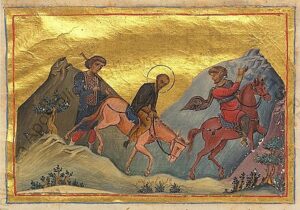
You can easily find the full account for yourself online… … OK, if you insist, I’ll make it easy for you:
1 This is from the OCA: https://www.oca.org/saints/lives/2023/01/27/100327-translation-of-the-relics-of-saint-john-chrysostom-archbishop-of
2 John Sadinopoulos’ Blog as always provides much information. https://www.johnsanidopoulos.com/2018/01/synaxarion-for-translation-of-relics-of.html
https://www.johnsanidopoulos.com/2010/01/translation-of-relics-of-st-john.html
3 Or here is an account which briefly covers the events of his life which led up to his exile, death, and translation back to The City – why, for heaven sake, it’s one I wrote five years ago! https://frbillsorthodoxblog.com/2019/02/01/104-the-return-of-saint-john-chrysostom/
Now, as I was saying: All the above tells the striking story about Chrysostom. But how much better it would be if we could have a conversation with this wonderful man and know him face to face. We can’t, not on this side of the grave. Besides I believe the saints have continued to move even “farther up and farther in” as C.S. Lewis put it – advancing “from glory to glory” in the words of Saint Gregory of Nyssa. Even if, on the other side of the grave, I could for a moment catch up with John Chrysostom, I suspect I would be like a babbling newborn infant in the presence of that spiritual giant.
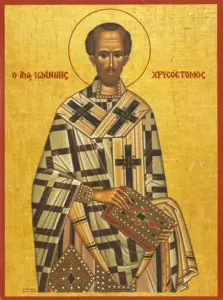
However, in a way we can get acquainted with Chrysostom now – through his writings, in which the heart and mind and soul of this great man are revealed to us. He was the greatest “Bible preacher” in all history. He proclaimed the Gospel in church almost daily with enthusiasm and clarity and at great length – often very great length – but people loved it, hung on almost his every word. Even pagans came to hear him. He was brilliant but down to earth, explaining the most profound theological and moral matters in simple terms. He was challenging but often could be humorous, entertaining. All this was how he got the popular title “Chrysostomos” (Χρυσόστομος,”golden mouth”) – “golden-tongued”, we would say. Still extant after all these seventeen centuries are more than seven hundred of his homilies, seventeen of his treatises, plus commentaries on Matthew and on Paul’s Letters to the Romans, Corinthians, Ephesians and Hebrews, and also 241 of his personal letters.
However, fact is that few of us are ever going to get around to reading much of him. So the next best thing would be to read some of his most notable sayings therefrom.
The quotes below are just a few of the many that can be found in various places online. For the most part, these are not in any particular order – just ones that struck me as I searched. I suggest that you and I ponder them a bit, not just whip through them.
So now, open your eyes and your spiritual ears and…
Listen to Saint John Chrysostom.
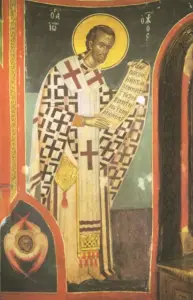
“Of all the afflictions that burden the human race, there is not one, whether spiritual or bodily, that cannot be healed by the Holy Scriptures.”
“The Holy Scriptures were not given to us that we should enclose them in books, but that we should engrave them upon our hearts.”
“Even if we have thousands of acts of great virtue to our credit, our confidence in being heard must be based on God’s mercy and His love for men. Even if we stand at the very summit of virtue, it is by His mercy that we shall be saved.”
“It is impossible to be saved without the help of the Most Blessed Virgin, because those who are not saved by the justice of God are saved by the intercession of Mary.”
“Mary was made Mother of God to obtain salvation for many who, on account of their wicked lives, could not be saved according to the rigor of Divine justice, but might be saved with the help of her sweet mercy and powerful intercession.”
“The Eucharist is a fire that inflames us, that, like lions breathing fire, we may retire from the altar being made terrible to the devil.”
“If you cannot find Christ in the beggar at the church door, you will not find Him in the chalice.”
“You cannot pray at home, like you can at church, where there is a great multitude; where exclamations are cried out to God as from one great heart, and where there is something more: the unions of minds, the accord of souls, the bond of charity, the prayers of priests.”
“Christians above all men are forbidden to correct the stumblings of sinners by force.”
“It is certainly a greater and more wonderful work to change the minds of enemies, bringing about a change of soul, than to kill them.”
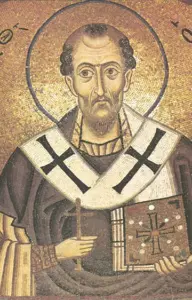
“No matter how just your words may be, you ruin everything when you speak with anger.”
“As a moth gnaws a garment, so does envy consume a man.”
“God asks little, but He gives much.”
“Do not despair, do not despond, but renew your soul by repentance, and tears, and Confession, and by doing good things. And never cease doing this.”
“Every man is the painter and the sculptor of his own life.”
“Prayer is the root, the fountain, the mother of a thousand blessings.”
“Fasting of the body is food for the soul.”
“The rich man is not one who is in possession of much, but one who gives much.”
“Faithfulness in little things is a big thing.”
“The primary goal in the education of children is to teach, and to give the example of, a virtuous life.”
“Laughter has been implanted in our soul, that the soul may sometime be refreshed.” *
- By the way, this saying gives great relief to me. I had read elsewhere that John disapproved of laughter.
“The road to Hell is paved with the bones of priests and monks, and the skulls of bishops are the lamp posts that light the path.” *
- This saying does not bring me any relief.
“The love of husband and wife is the force that welds society together.”
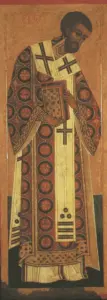
“Riches are not forbidden, but the pride of them is.”
“Mercy imitates God and disappoints Satan.”
“Be ashamed when you sin, not when you repent.”
“Slander is worse than cannibalism.”
“Only those who do not fight are never wounded.”
“Why not learn to enjoy the little things – there are so many of them.”
“It is simply impossible to lead, without the aid of prayer and a virtuous life.”
“What greater work is there than training the mind and forming the habits of the young?”
“But first I want you to tell me this: do you know the power of love? Christ passed over all the marvellous works which were to be performed by the apostles and said, “By this shall men know that you are my disciples, if you love one another.”
“What the soul is in the body, let Christians be in the world.”
“Nothing will divide the church so much as the love of power.”
“Let no one mourn that he has fallen again and again; for Forgiveness has risen from the grave.”
“No act of virtue can be great if it is not followed by advantage for others. So, no matter how much time you spend fasting, no matter how much you sleep on a hard floor and eat ashes and sigh continually, if you do no good to others, you do nothing great.
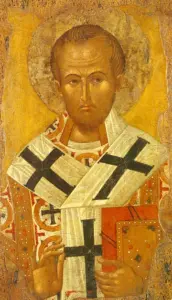
Directed to young men:
“Why do you sow where the field is eager to destroy the fruit? Where there are medicines of sterility? Where there is murder before birth? You do not even let a harlot remain only a harlot, but you make her a murderess as well. Indeed, it is something worse than murder, and I do not know what to call it; for she does not kill what is formed, but prevents its formation. What then? Do you condemn the gifts of God, and fight with His laws? What is a curse, do you seek as though it were a blessing? Do you make the anteroom of slaughter? Do you teach the women who are given to you for procreation of offspring to perpetuate killing?”
Directed to husbands:
“Always begin by telling [your wife] now much you love her… Tell her that you love her more than your own life, because this present life is nothing, and that your only hope is that the two of you pass through this life in such a way that in the world to come you will be united in perfect love. Say to her, ‘Our time here is brief and fleeing, but if we are pleasing to God, we can exchange this life for the Kingdom to come. Then we will be perfectly one both with Christ and each other, and our pleasure will know no bounds. I value your love above all things, and nothing would be so bitter or painful to me as our being at odds with each other. Even if I lose everything, any affliction is tolerable if you will be true to me.”
“Pray together at home and go to church; when you come back home, let each ask the other the meaning of the readings and the prayers… Remind one another that nothing in this life is to be feared, except offending God. If your marriage is like this, your perfection will rival the holiest of monks… Be sure that you humble yourself and that your words are full of grace and kindness… If we order our lives in this way and diligently study the Scriptures, we will find lessons to guide us in everything we need!”
“What sort of person do you think the children of such parents will be?… For generally the children acquire the character of their parents, are formed in the mold of their parent’s temperament, love the same things their parents love, talk in the same fashion, and work for the same ends… In this way we will be able to please God, and to pass through the course of this life in virtue and to gain those blessings which He has promised to those who love Him.
“Not to share our own wealth with the poor is theft from the poor and deprivation of their means of life; we do not possess our own wealth, but theirs.”
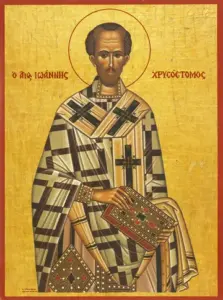
“Helping a person in need is good in itself. But the degree of goodness is hugely affected by the attitude with which it is done. If you show resentment because you are helping the person out of a reluctant sense of duty, then the person may recieve your help but may feel awkward and embarrassed. This is because he will feel beholden to you. If, on the other hand, you help the person in a spirit of joy, then the help will be received joyfully. The person will feel neither demeaned nor humiliated by your help, but rather will feel glad to have caused you pleasure by receiving your help. And joy is the appropriate attitude with which to help others because acts of generosity are a source of blessing to the giver as well as the receiver.”
“A friend is more to be longed for than the light; I speak of a genuine one. And wonder not: for it were better for us that the sun should be extinguished, than that we should be deprived of friends; better to live in darkness, than to be without friends”
“Let the mouth also fast from disgraceful speeches and railings. For what does it profit if we abstain from fish and fowl and yet bite and devour our brothers and sisters? The evil speaker eats the flesh of his brother and bites the body of his neighbor. ”
“What is dying? Just what it is to put off a garment. For the body is about the soul as a garment; and after laying this aside for a short time by means of death, we shall resume it again with more splendor.”
Let’s conclude with something all Orthodox have heard often before. This is read in every Orthodox Church just before the beginning of Paschal Divine Liturgy:
The Paschal Homily of Saint John Chrysostom
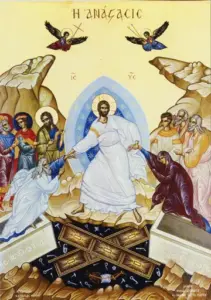
“Is there anyone here who is a devout lover of God?Let them enjoy this beautiful bright festival.
Is there anyone who is a grateful servant?
Let them rejoice and enter into the joy of their Lord!
Are there any now weary with fasting?
Let them now receive their wages!
If they have toiled from the first hour, let them receive their due reward;
If any have come after the third hour, let him with gratitude join in the Feast!
And he that arrived after the sixth hour,
let him not doubt; for he shall have sustained no loss.
And if any have delayed until the ninth hour,
let him not hesitate; but let him come too.
And he who arrived only at the eleventh hour,
let him not be afraid by reason of his delay.
For the Lord is gracious and receives the last even as the first.
He gives rest to him who comes at the eleventh hour,
as well as to him who toiled from the first.
To this one He gives, and upon another He bestows.
He accepts the work as he greets the endeavor.
The deed He honors and the intention He commends.
Let us all enter into the joy of the Lord!
First and last alike, receive your reward;
rich and poor, rejoice together!
Sober and slothful, celebrate the day!
You that have kept the fast, and you that have not,
rejoice today for the Table is richly laden!
Feast royally on it, the calf is a fatted one.
Let no one go away hungry; partake, all, of the cup of faith.
Enjoy all the riches of His goodness!
Let no one grieve at his poverty,
for the universal kingdom has been revealed.
Let no one mourn that he has fallen again and again;
for Forgiveness has risen from the grave.
Let no one fear death, for the death of our Savior has set us free.
He has destroyed it by enduring it.
He destroyed Hades when he descended into it.
He put it into an uproar even as it tasted of His flesh.
Isaiah foretold this when he said,
You, O Hell, have been troubled by encountering Him below.
Hell was in an uproar because it was done away with.
It was in an uproar, because it was mocked.
It was in an uproar, for it was destroyed.
It is in an uproar, for it is annihilated.
It is in an uproar because it is now made captive.
Hell took a body, and it discovered God.
It took earth, and encountered Heaven.
It took what it saw, and was overcome by what it did not see.
O death, where is your sting?
O Hades, where is your victory?
Christ is risen, and you, O death, are annihilated!
Christ is risen, and the evil ones are cast down!
Christ is risen, and the angels rejoice!
Christ is risen, and life is liberated!
Christ is risen, and the tomb is emptied of its dead;
for Christ, having risen from the dead,
is become the first-fruits of those who have fallen asleep.
To Him be glory and power forever and ever. Amen!
And finally the last words of Saint John Chrysostom before he died in exile:
“Glory to God for all things!“
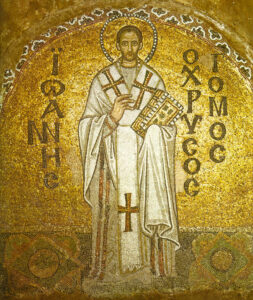
_____________________________________
Next Week: probably Saint Brigid of Kildare
Week after Next: Saint Photios the Great